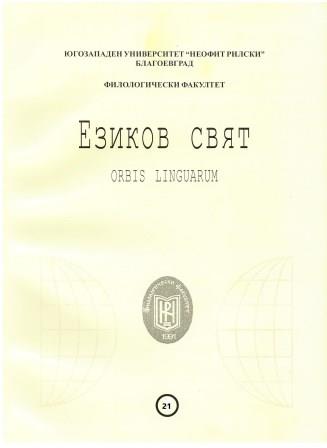КЪМ ВЪПРОСА ЗА СЕГАШНИТЕ СТРАДАТЕЛНИ ПРИЧАСТИЯ В ГРЪЦКИЯ И БЪЛГАРСКИЯ ЕЗИК
ON THE CATEGORY OF THE PRESENT PASSIVE PARTICIPLES IN GREEK AND BULGARIAN
Author(s): Desislava Yordanova-PetrovaSubject(s): Language and Literature Studies, Theoretical Linguistics, Morphology, Comparative Linguistics
Published by: ЮГОЗАПАДЕН УНИВЕРСИТЕТ »НЕОФИТ РИЛСКИ«
Keywords: present passive participles; functional equivalents; Greek language; Bulgarian language
Summary/Abstract: The present article is a comparative study of the present passive participles in Greek and Bulgarian, their meaning, use, as well as the Bulgarian equivalents of the Greek present passive participles. From a typological point of view, we can assign the present passive participle to the category of linguistic phenomena that exist in Bulgarian and Greek, but differ significantly in their meaning and use. It was this fact that generated my interest in the type of participle in question, and the purpose of the present study is, with the help of comparative analysis, to reveal the main similarities and differences in the meanings and use of the present passive participle in Greek and Bulgarian. In the first part of the study, a system-level analysis was performed – the formation, meaning and use of the present passive participles in each of the two languages are presented separately. Even here, significant differences emerge in the characteristics of the studied participles in the two languages. In the second part of the study, the analysis moves to the level of speech – the concrete implementation in speech of the present passive participles is analyzed, by means of a comparison of their use in certain texts and for this purpose, documents issued by the European Union and translated into Greek and Bulgarian have been selected.
Journal: Езиков свят - Orbis Linguarum
- Issue Year: 21/2023
- Issue No: 3
- Page Range: 089-099
- Page Count: 11
- Language: Bulgarian

